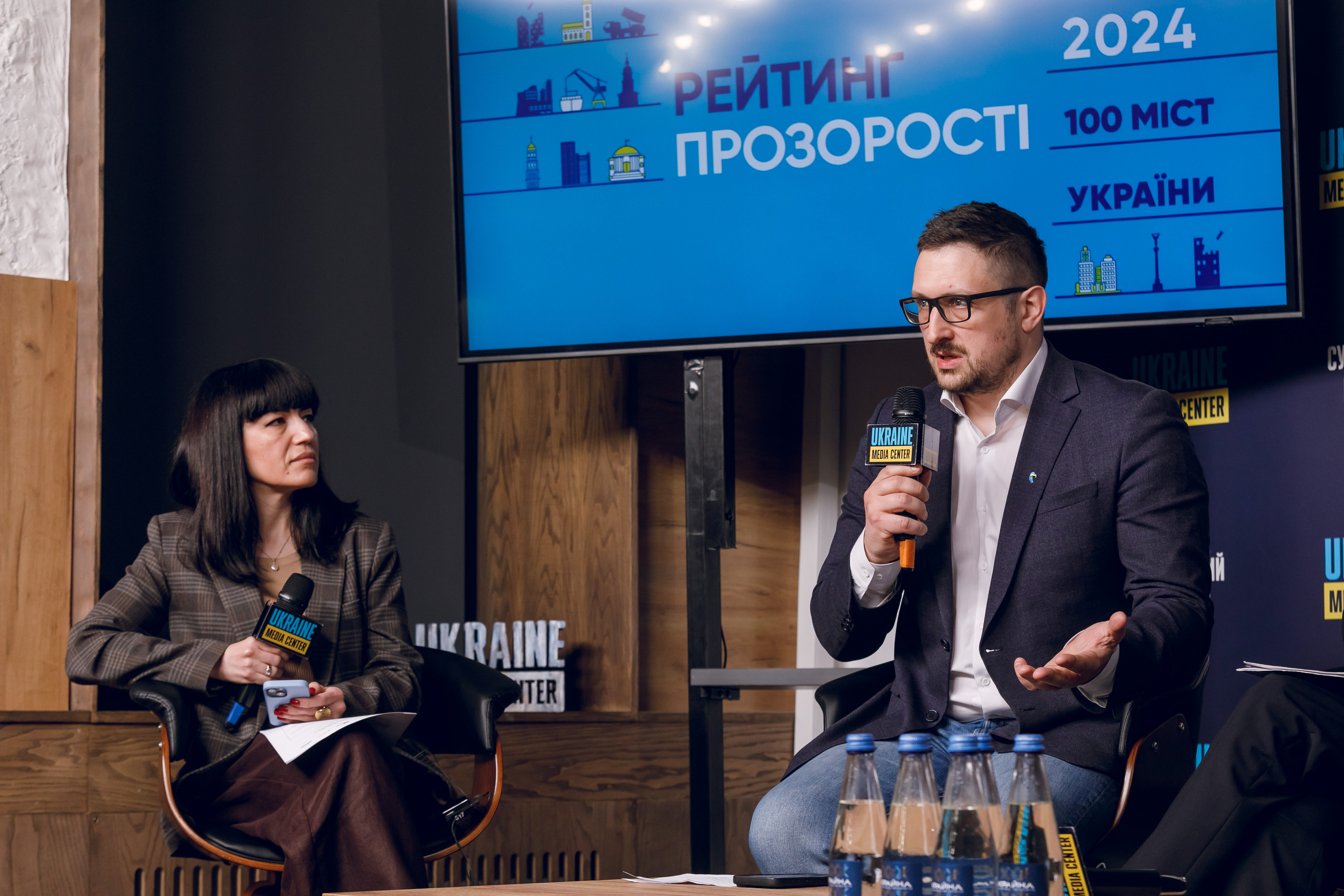On May 19, Transparency International Ukraine’s Transparent Cities program presented the results of the 2024 Transparency Ranking, assessing how cities performed during the full-scale war. Analysts evaluated 100 municipalities across 21 regions of Ukraine based on 70 criteria.
In 2024, 5 cities became transparent. The top three cities in the ranking, for the first time since the start of the full-scale invasion, were Chernivtsi, Vinnytsia, and Lutsk. The 2023 leaders, Mukachevo and Lviv, ranked fourth and fifth, respectively. A total of 22 cities received the status of “partially transparent,” while the remaining 72 remained in the “non-transparent” category.

It is openness in times of crisis that gives cities resilience, and system-level solutions developed before the full-scale invasion enable them to adapt more quickly to new circumstances. This was highlighted during the presentation of the Transparency Ranking.
“Even during a full-scale war, transparency remains critically important. As both our program’s experience and our cooperation with Western partners show, donors are more willing to support those who are transparent and easy to understand. For me, transparency and openness are also about moving closer to Europe. Of course, some critics say that Ukraine has more open data than some European countries — but Europe doesn’t face the same scale of challenges that Ukraine does,” said Andrii Borovyk, Executive Director of TI Ukraine.

The average level of city transparency constitutes 41.6%. Across all areas presented by the program, cities demonstrated the strongest performance in indicators related to openness (43.6%), public relations (41.7%), and response to war-related challenges (39.6%). Most indicators were marked as “not implemented” in the areas of citizen services (67%), municipal property and land management (61.1%), and HR policy and integrity (60.3%).
“Our long-term assessments show that a key success factor for cities is consistent and continuous work on transparency. It is essential that cities analyze their needs, respond quickly to challenges, seek and raise resources when possible, and embed transparency into their internal culture. None of this is possible without political will and responsible leadership,” said Anastasiia Mazurok, Chief Operating Officer of Transparency International Ukraine.
During the discussion, city mayors shared their experiences in building trust in the authorities and setting up transparency. “Transparency is more of a philosophy — it should be part of the foundation. If it’s not in your mindset, it won’t appear on paper, and it won’t be reflected in your actions,” noted Rehina Kharchenko, Mayor of Zaporizhzhia.
According to her, the Transparency Ranking has become a reference point for the city. Since the beginning of 2024, her team has analyzed the criteria and systematically built new processes, from monthly data collection from municipal companies to the relaunch of public councils.

Roman Klichuk confirmed that the Ranking has also served as an additional driver for change in Chernivtsi. During the discussion, the mayor noted that the city council had reviewed TI Ukraine’s transparency requirements and then issued “orders with warnings that needed to be implemented. And here is the result.”
During the discussion, the speakers supported the analysts’ conclusion that a city’s transparency depends primarily on the political will of its leadership.
“Political will is truly important. It’s not some abstract concept — it’s a specific person who either chooses to prioritise transparency or not, believing there are other, more pressing matters,” noted Andrii Borovyk.
“Everything depends on political will and the local government team. If there is a clear understanding of what needs to be done, then it gets done,” confirmed Roman Klichuk, Mayor of Chernivtsi.
According to the speakers, citizen trust and an established dialogue with the community are essential for effective city governance.
“Transparency means clear game rules for everyone — for businesses, investors, and taxpayers. Trust is now one of the pillars of our survival. We must create conditions in society where people would likely listen to me rather than some Russian channel that spends 8 million dollars a year on disinformation. For my voice to carry weight, I need to work every day to be in touch and in continuous communication with residents,” said Rehina Kharchenko.
Roman Klichuk also emphasized the importance of ongoing dialogue with residents to better understand their needs, both through face-to-face meetings and via social media.

This year, new indicators in the assessment revealed certain patterns, showing that not all cities adequately analyze citizens’ needs or respond to current challenges in a timely manner. As a result, some of last year’s top performers saw a decline in their transparency levels — they focused solely on following the program’s formal recommendations, overlooking the actual state of affairs on the ground.
“Genuine interaction with citizens is what matters, not formal, “for show” engagement. When there is a real understanding of how to involve an active public and harness the potential of that collaboration, it leads to systemic results,” concluded Anastasiia Mazurok.
Representatives of local authorities must work systematically to enhance transparency, demonstrate the courage to adopt new governance practices, and establish continuous communication with residents to build trust. Under these conditions, our cities will be more resilient to new challenges and more attractive to investors and international partners — a crucial factor for future recovery and European integration.